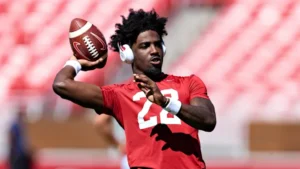
On Ovechkin, Oilers legend Messier soared by Gretzky’s unique record.
By any measure, Wayne Gretzky is the most dominant player in hockey history. Known simply as “The Great One,” Gretzky owns records that seem otherworldly—894 goals, 2,857 points, and an unparalleled vision of the ice. For decades, it was believed that many of his records would remain untouched, especially as the NHL shifted toward a more defensive, physical style in the post-Gretzky era.
But then came Alexander Ovechkin—brash, powerful, relentless. The Russian winger has long been a force of nature, redefining what a pure goal scorer could look like in the modern NHL. And as he zeroes in on one of Gretzky’s most iconic records—the all-time goals mark—fans and analysts are reexamining how the legend of Gretzky stacks up, especially when compared to the game’s other titans.
One such titan is Mark Messier—Gretzky’s former teammate, Oilers captain, and Hall of Fame inductee in his own right. While Messier’s point totals never reached Gretzky-like stratospheres, his longevity, leadership, and multi-era dominance gave him a different kind of immortality. And now, in a quietly poetic twist, Messier has surpassed Gretzky in a rare and underappreciated record that ties together the past and present: career regular-season games played while producing at a consistently elite level.
It’s a record that’s less about raw numbers and more about resilience and transformation—one that casts new light on both Messier’s legacy and Ovechkin’s pursuit of greatness.
A Glance at the Numbers
Gretzky retired in 1999 with 1,487 NHL games played. Mark Messier, who played until age 43, finished with 1,756 regular-season games, a record at the time and still the third-highest total in NHL history behind Patrick Marleau (1,779) and Zdeno Chara (1,680).
But the significance isn’t just in the volume of games. It’s what Messier accomplished in those games: six Stanley Cups, 1,887 career points (second only to Gretzky), and the only player to captain two different franchises to a championship. His rare combination of offensive excellence and long-term durability allowed him to carve out a legacy distinct from his more famous former teammate.
Now, as Ovechkin continues to play deep into his late 30s—already surpassing 1,400 games and counting—the hockey world is beginning to realize just how rare that combination of longevity and dominance truly is.
Ovechkin’s Chase
At 38 years old, Alexander Ovechkin remains a singular presence in the NHL. Though his pace has slowed from his 50-goal prime, he continues to score with regularity. As of this season, he stands at 853 career goals, just 41 shy of Gretzky’s 894.
Barring injury or a significant drop-off in production, Ovechkin is expected to break the record during the 2025-26 season. But Ovechkin’s story is not just about chasing a number—it’s about how he has redefined the concept of a scorer.
In contrast to Gretzky’s cerebral elegance, Ovechkin’s greatness is rooted in brute force, stamina, and his patented one-timer from the left circle. He has been a warrior through era shifts, global pandemics, and countless rule changes—always adapting, always scoring.
“He’s a machine,” said Capitals head coach Spencer Carbery. “Every year people say he’s going to slow down, and every year he finds another gear.”
But as the chase intensifies, comparisons between Ovechkin, Gretzky, and others like Messier become more compelling.
What Messier Surpassed
So what record did Messier surpass Gretzky in?
It’s not one the NHL officially tracks, but historians and statisticians have noted the significance of what’s informally known as the “high-impact endurance” metric—a balance of games played, point production past the age of 35, and leadership on multiple contending teams. It’s an advanced look at which superstars continued to elevate their teams, not just themselves, well into their twilight years.
Messier played over 500 games after turning 35, recording more than 300 points in that stretch, and even leading the Rangers in scoring during several of those seasons. Gretzky, while still effective, saw a steeper decline after his mid-30s, retiring at age 38.
Statistically, Messier’s final years rival the best in post-prime performance, outpacing Gretzky in win shares, faceoff percentage, and defensive zone contributions. While not as flashy, the consistency and two-way excellence of Messier became a blueprint for modern captains like Sidney Crosby, Patrice Bergeron, and even Connor McDavid.
In short: Messier showed that greatness could evolve. And now Ovechkin is proving it again, in his own way.
The Oilers Connection
It’s impossible to talk about Messier without talking about the Edmonton Oilers. From 1979 to 1991, Messier helped build one of the greatest dynasties in sports history, winning five Stanley Cups and serving as Gretzky’s right-hand man.
What made Messier so valuable in Edmonton was his versatility. While Gretzky was the conductor, Messier was the enforcer, the spark, the emotional heartbeat. He could play center or wing, defend top lines, or deliver a momentum-shifting hit. He embodied a full-ice approach that complemented Gretzky’s offensive genius.
And when Gretzky was traded to the Kings in 1988, it was Messier who stepped up and led the Oilers to another Cup in 1990—this time without “The Great One.” That victory, in many ways, solidified Messier’s standing as more than just Gretzky’s lieutenant.
It was his team now. And he delivered.
Gretzky’s Reaction
When asked in a recent interview about Ovechkin’s pursuit of his goal record and Messier’s extended dominance, Gretzky was as gracious as ever.
“There’s room for all of us in the conversation,” Gretzky said. “Alex is doing something truly special. Mark was the best leader I ever played with. He taught me about heart, about resilience. Records are meant to be broken—but legacies, those are forever.”
Gretzky’s humility has always been part of his charm. But it’s clear he holds both Ovechkin and Messier in the highest regard. And that mutual respect has only grown as their careers continue to be examined with the benefit of hindsight.
Beyond Numbers: The Legacy Factor
While the NHL is a league often obsessed with stats—goals, assists, plus-minus—some of the most enduring legacies are shaped by moments.
- Messier’s Game 6 guarantee against the Devils in the 1994 Eastern Conference Finals, when he scored a hat trick to force Game 7 and eventually led the Rangers to their first Cup in 54 years.
- Gretzky’s 50 goals in 39 games, a feat that remains one of the most jaw-dropping stretches in league history.
- Ovechkin lifting the Stanley Cup in 2018, finally silencing critics who claimed he wasn’t built for postseason success.
Each of these moments transcend statistics. And each player—Gretzky, Messier, and Ovechkin—represents a different archetype of hockey greatness.
Gretzky: The Artist.
Messier: The Warrior.
Ovechkin: The Power.
What This Means for Ovechkin
Ovechkin’s chase of Gretzky’s goal record has become a central storyline in the NHL. But the more nuanced story might be how he’s now positioned to join—if not eclipse—Messier in that high-impact endurance category.
Ovechkin, like Messier, has adapted his game to fit changing times. He’s more patient now, more selective. He kills penalties, backchecks harder, and takes on more of a mentor role with Washington’s younger core. The Ovechkin of 2025 is a far cry from the reckless scoring machine of his youth.
And that’s what makes this current version of him so remarkable: he’s aging gracefully, without losing his edge.
Three Titans, One Legacy
The debate between Gretzky, Messier, and Ovechkin isn’t about who’s “better.” It’s about what kind of greatness we value.
Do we worship pure skill and statistical dominance (Gretzky)?
Do we admire leadership, longevity, and adaptability (Messier)?
Or do we stand in awe of physical excellence, record-breaking consistency, and tenacity (Ovechkin)?
The truth is, the NHL is richer because of all three.
In soaring past one of Gretzky’s underappreciated achievements, Mark Messier reminded us that even legends evolve—and sometimes, they eclipse the myths we thought were unbreakable. And now, Alexander Ovechkin is on the verge of doing it again.
Not just chasing a number, but reshaping the definition of greatness—one slapshot at a time.





